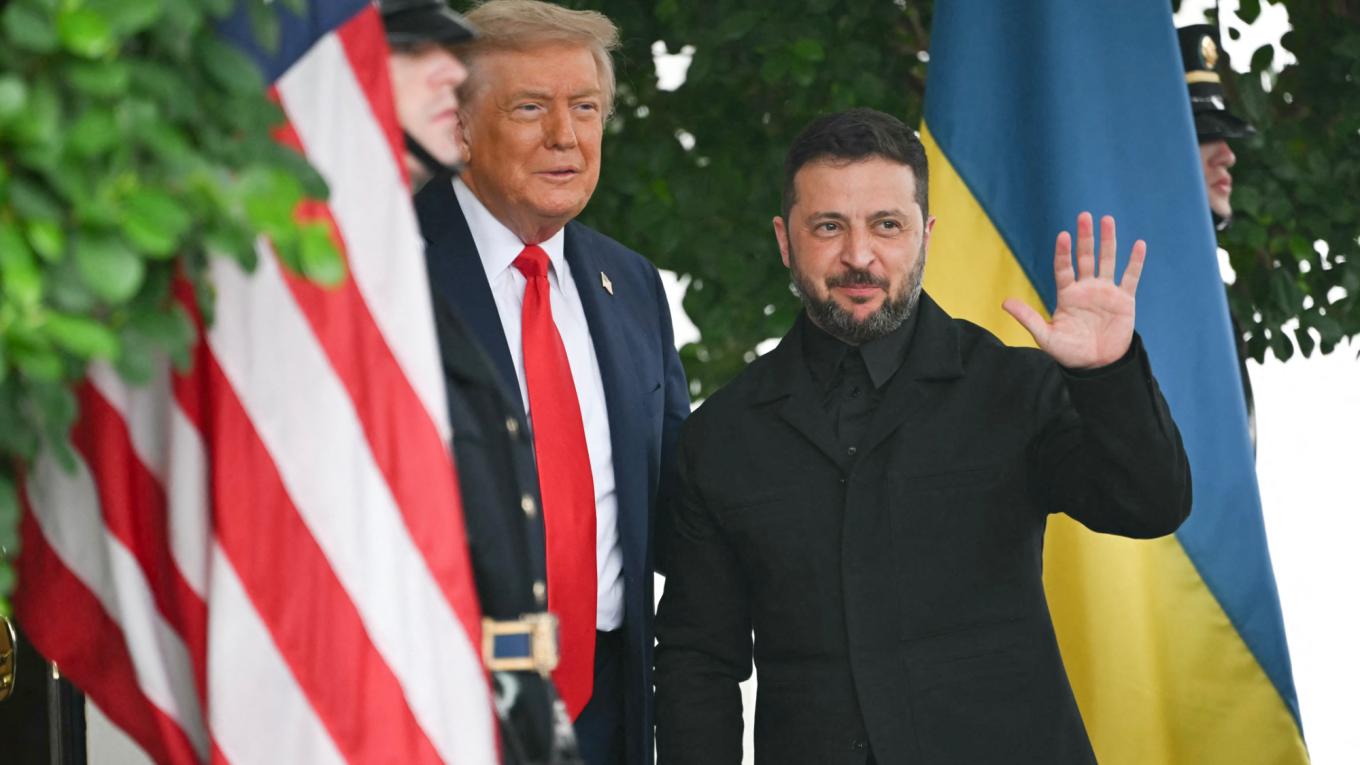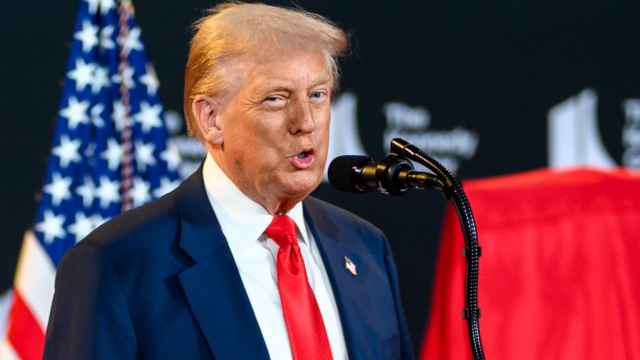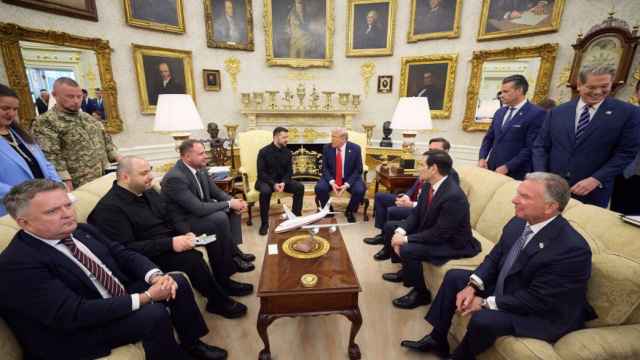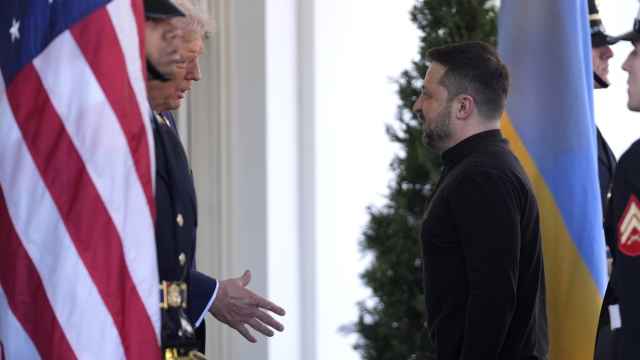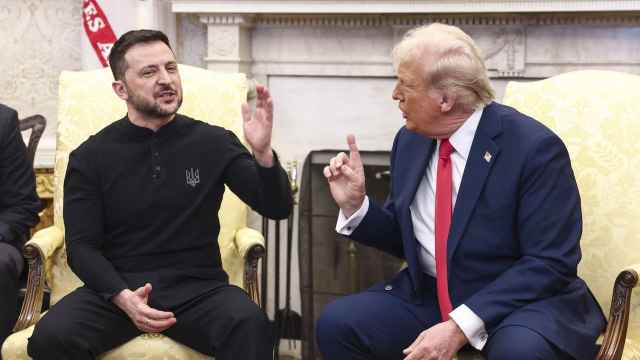U.S. President Donald Trump announced on Monday that plans are underway for a meeting between Russia’s Vladimir Putin and Ukraine’s Volodymyr Zelensky following a phone call with the Kremlin leader that wrapped up a day of high-stakes talks between European leaders and the Ukrainian president in Washington, D.C.
“I had a very good meeting with distinguished guests,” Trump wrote on his Truth Social platform after multilateral talks at the White House attended by Zelensky, EU Commission head Ursula von der Leyen, NATO Secretary General Mark Rutte, as well as the leaders of Britain, France, Italy, Germany and Finland. “Everyone is very happy about the possibility of PEACE for Russia/Ukraine.”
Trump said he spoke with Putin following the talks to begin arranging a meeting between Zelensky and the Russian leader “at a location to be determined,” after which a trilateral session including himself would take place. He said Vice President J.D. Vance, Secretary of State Marco Rubio and special envoy Steve Witkoff would coordinate with Russia and Ukraine in planning the upcoming meeting.
Zelensky later told reporters that he is “ready for a bilateral meeting with Putin,” describing the White House talks as “the best” he has had with Trump. “I was able to show many things, even on the map, to all American colleagues regarding the situation on the battlefield,” he said in a statement.
While there was no immediate confirmation from officials in Moscow about a planned meeting between the presidents of the two warring countries, AFP, citing a source familiar with Trump’s phone call conversation with Putin, reported that the Russian leader said he was open to bilateral talks with Zelensky.
European leaders rallied behind Trump earlier in the day as he said Ukraine might receive security guarantees as part of a potential peace deal with Russia, a step they said would reshape the continent’s security landscape and one that could put pressure on both Kyiv and Moscow to agree on terms for ending the war.
“President Putin agreed that Russia would accept security guarantees for Ukraine. And this is one of the key points that we need to consider, and we’re going to be considering that at the table,” Trump, who met with Putin in Alaska late last week, said as he opened Monday’s multilateral talks. “I think the European nations are going to take a lot of the burden. We’re going to help them. And we’re going to make it very secure.”
Each of the participants in the hastily organized meeting praised Trump for his role in trying to mediate an end to the war in Ukraine, while also driving home the importance of security guarantees as the foundation of any settlement between Moscow and Kyiv.
“When we speak about security guarantees, we speak about the whole security of the European continent, and this is why we are all united here with Ukraine on this matter,” French President Emmanuel Macron said, adding that European countries are “lucid” about contributing their fair share to maintaining such guarantees.
After each leader delivered opening remarks, the talks continued behind closed doors. During that session, multiple news outlets reported that Trump paused the meeting to take a phone call with Putin, though U.S. officials denied those reports in comments to Fox News. The Kremlin later confirmed the call, saying it took place after the White House meeting and lasted about 40 minutes.
“The idea was raised that it would be worth considering the possibility of elevating the level of the Ukrainian and Russian representatives taking part in the direct talks,” Kremlin foreign policy adviser Yuri Ushakov told state media in what appeared to be a reference to a future Putin-Zelensky meeting.
Ushakov noted that Putin “once again emphasized the importance of Trump’s personal efforts to find solutions that could lead to a long-term settlement in Ukraine.”
Earlier on Monday, Zelensky, wearing a black suit jacket and dress shirt, was greeted at the White House by a smiling Trump, who pumped his fist in the air before shaking hands with the Ukrainian leader. Asked by reporters if he had anything to say ahead of the talks, Trump said: “We love them.”
Before the multilateral meeting with European leaders, Zelensky and Trump held one-on-one talks and spoke to the press in the Oval Office. During that sit-down, Trump threw cold water on one of Ukraine’s main demands — that current negotiations on ending the war should be focused on achieving an immediate ceasefire.
“I don’t think you need a ceasefire,” Trump told reporters. “I know that it might be good to have, but I can also understand, strategically, why one country or the other wouldn’t want it. You have a ceasefire, and they rebuild, and rebuild, and rebuild. And maybe they don’t want that.”
The talks between Trump, Zelensky and European officials come just days after the American president held a short summit with Putin in Alaska, during which the Kremlin leader was said to have outlined his conditions for signing a peace deal with Ukraine.
While the exact details of those demands have not been made public, a flurry of reports over the weekend suggest they hinge on Kyiv ceding claim to the regions of Donetsk and Luhansk in eastern Ukraine, including territory not currently occupied by Russian forces.
Trump himself had said last week that “There’ll be some land swapping going on.” And on Sunday, he urged Ukraine to give up the annexed Crimean peninsula, as well as abandon its ambitions to join NATO, both key demands from Putin.
Ukraine has repeatedly rejected handing over its territory to Russia as a precondition for peace, but White House officials are likely hoping that new Russian concessions will nudge Kyiv toward some kind of settlement with Moscow.
Trump’s short-term goal now appears to be organizing a trilateral meeting between him, Putin and Zelensky, something both the U.S. and Ukrainian presidents have previously pushed for without any success. Absent any immediate concessions from Ukraine, Putin is unlikely to agree to that kind of meeting as he has repeatedly questioned Zelensky’s legitimacy as president.
“If we don’t have a ‘trilat,’ then the fighting continues,” Trump told reporters in the Oval Office alongside Zelensky earlier on Monday. “I think if we have a ‘trilat’ there’s a good chance of maybe ending [the war].”
In an interview with CNN on Sunday, special envoy Witkoff said that the United States and Russia had agreed on a security guarantee framework for Ukraine that would represent a major shift in Moscow’s acceptable conditions for ending the ongoing war, which Moscow launched in February 2022.
“We got to an agreement that the United States and other European nations could effectively offer ‘Article 5-like language’ to cover a security guarantee,” Witkoff said, referring to NATO’s collective defense clause.
Trump had briefed Zelensky on his meeting with Putin in an hour-long phone call aboard Air Force One after leaving the Alaska summit. Facing what is likely to be intense pressure to accede to Moscow’s demands, Zelensky met privately with European allies dubbed the “coalition of the willing” over the weekend to prepare for his meeting with Trump.
Later on Monday, The Financial Times, citing a document it had seen, reported that Ukraine would promise to buy $100 billion of American weapons with European financing as part of a plan to secure security guarantees after striking a peace deal with Russia. Under that proposal, Washington and Kyiv would also agree to a $50 billion agreement to produce Ukrainian drones.
Zelensky confirmed the arms deal after the White House meeting, but said it would amount to $90 billion. He also said that Ukraine and its allies would formalize the terms of the security guarantees within the next 10 days.
A Message from The Moscow Times:
Dear readers,
We are facing unprecedented challenges. Russia's Prosecutor General's Office has designated The Moscow Times as an "undesirable" organization, criminalizing our work and putting our staff at risk of prosecution. This follows our earlier unjust labeling as a "foreign agent."
These actions are direct attempts to silence independent journalism in Russia. The authorities claim our work "discredits the decisions of the Russian leadership." We see things differently: we strive to provide accurate, unbiased reporting on Russia.
We, the journalists of The Moscow Times, refuse to be silenced. But to continue our work, we need your help.
Your support, no matter how small, makes a world of difference. If you can, please support us monthly starting from just $2. It's quick to set up, and every contribution makes a significant impact.
By supporting The Moscow Times, you're defending open, independent journalism in the face of repression. Thank you for standing with us.
Remind me later.




